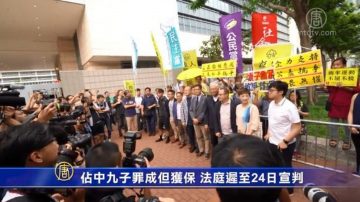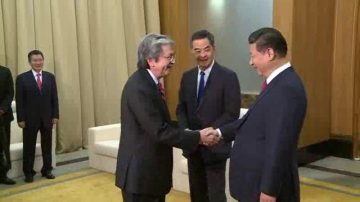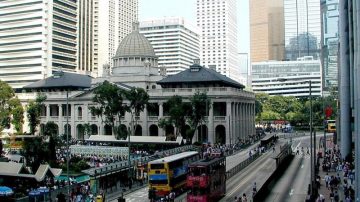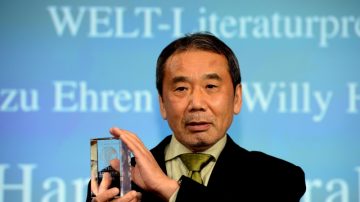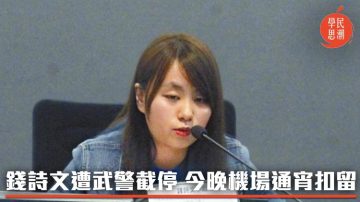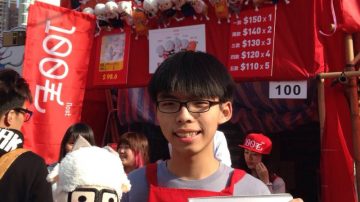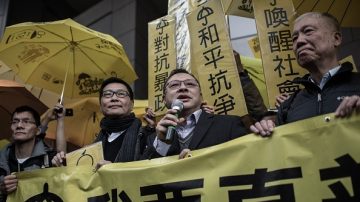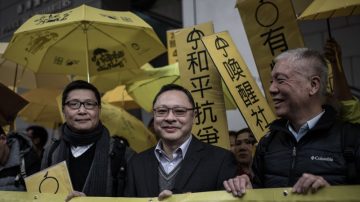【新唐人2014年12月02日讯】香港占中运动12月1号踏入第65天,“学联”、“学民思潮”在前一天晚上将行动升级,呼吁包围政府总部。数千名市民响应,并一度占据了龙和道。冲突一直持续到1号早晨,警方通过清场,重开了龙和道。评论人士指出,港府的拖延策略引发了这样高成本的结果,呼吁尽快用政治手段给予回应解决。
星期天(11月30号)晚上6点,金钟占领区举行主题为“对准政权、誓争民主”的集会。到晚上8点左右,参加者增加到4,000多人。晚上9点,“双学”将运动升级,“学联”宣布“对准政权,包围政总”,呼吁集会者按自身情况,兵分几路包围政府总部大楼的各出入口。
几千名集会者立即响应,带着头盔、口罩、眼镜,突破警方防线,涌上龙和道,警方则近距离喷射胡椒喷雾、催泪水剂,并使用警棍,示威者用雨伞和自制的盾牌抵抗。
学联秘书长周永康:“今晚的行动是向政府施加更多压力。因为大家可见政府正在采取一种策略,以避免回应人民对政改的意见。如果我们不得不迫使政府积极回应,我们就要施加更大压力,同时,包围政总大楼是迫使政府面对公众的方式之一。”
香港大学新闻传媒研究中心助理教授傅景华:“因为政府从开始到现在,还没有用政治方法去回应学生。在最近大部分时间,政府都是用警察、法律、清场去回应。在这个事情下,学生将行动提高,完全是可以预期到的。”
香港《蘋果日报》说,到晚上快11点时,龙和道隧道已完全被示威者堵塞,占据东西六条行车线,并在隧道内架起铁马,与警方多次在隧道内对峙。警方多次出动胡椒喷雾及催泪水剂,估计带走最少几十名示威者。之后示威者步步推进到立法会道外。约11点,“学联”表示已包围政总,呼吁示威者留守。
12月1号早上,警方两次发起清场,由龙和道清场一路推进到金钟,9点多又与示威者在金钟海富中心附近爆发冲突。警方在控制了海富中心范围,天桥连接港铁站出口后,退回天桥上把守。不过,立法会上午的工作仍然受到影响。
香港城市大学教授郑宇硕:“今天早上,立法会的会议都要取消。”
“学联”秘书长周永康认为,冲击政总已成功瘫痪政府上午的运作,其实某种程度上已经代表行动成功。不过,在这次行动升级中,有不少示威者受伤,周永康对此表示抱歉,并说“双学”会承担责任。
香港大学新闻传媒研究中心助理教授傅景华认为,香港政府不应该再拖延,尽快用政治方法解决。
傅景华:“如果香港政府不可以回应的话,基本上应该安排学生跟人大相关的(官员)有个对谈。让他们有一个正常渠道讨论的方法。不是经常用方法叫学生用其他方法在街头去解决。这个感觉是非常非常,成本很高的一种方法。”
在“双学”将行动升级的同时,占中发起人之一的戴耀廷在《蘋果日报》撰文指出,旺角清场后,港人抗争的模式又再“升级”,但不再是与警方硬碰硬,而是以购物行街为由,在旺角的各条街道不断游走。面对这样的情况,使用武力也难解决问题,警方只能不断派员到这些“高危地区”守着,疲于奔命。
郑宇硕:“目前抗议者跟警方的对抗,有一点像打游击。就是警察来,抗议者就退一退,但是他们大可以过几天再来,也可以占另外一段马路。”
面对港府的“拖字诀”,郑宇硕教授表示,大家已经更明白,在可见的将来,很可能没有非常明显的效果。但和平非暴力的公民抗命将坚持下去。
郑宇硕:“事实上,过去两三个月,大家也看得很清楚。当香港人感到自己所非常珍惜的核心价值受到威胁的时候,他们都会跑出来抗议的。”
“学联”在星期天晚上发表声明,引用台湾民进党主席蔡英文在前一天的“九合一”地方选举中,大败执政国民党后的话说:“一个政府没站在人民这边,人民就会把权力收回去。”“学联”并呼吁特区政府必须回应撤回八三一框架,重启政改五步曲的诉求。否则将继续围堵政府总部,直至政府回归人民。
采访/秦雪 编辑/尚燕 后制/舒灿
Scholars Call on H K Govt to Respond to Escalated Actions
Hong Kong Occupy Central Movement is well into 65
days of action on Dec. 1.
The Hong Kong Federation of Students (the Federation)
and Scholarism escalated their actions the previous night.
They urged protesters to besiege government headquarters.
Thousands of Hong Kong residents responded and at once
occupied the Lung Wo Road.
Clashes continued until 1 a.m. the next morning, and
Lung Wo Road reopened to traffic after clearance by police.
Critics pointed out that it’s government procrastination
tactics that has led to such high-cost results.
The government is called on to a quick political resolution.
On Sunday 6 p.m., a rally was held in the occupied Admiralty
area, with a theme of "Target the regime, Fight for democracy".
About 8 p.m., the number of participants increased to over 4,000.
At 9 p.m. the two student organizations escalated the movement.
The Federation announced to "target the regime and lay siege to
government headquarters".
They urged protesters to surround entrances and exits
to government headquarters simultaneously
according to their respective situations.
Thousands of participants responded immediately.
Wearing helmets, gas masks and glasses, they broke through
the police cordon, and flocked to Lung Wo Road.
The police used pepper spray, tear gas and batons at close
quarters.
Protesters thus used umbrellas and homemade shields to resist.
The Federation leader, Alex Chow, "The action held tonight
is to generate more pressure on the government,
because you could see that the government is adopting a tactic
to avoid responding to people's opinion on the political reform.
And if we have to force the government to respond to us
in a positive way, then we have to generate more pressure,
and well, surrounding the governmental building,
it would be one to propel the government to face the public."
Dr. King-wa Fu, Assistant Professor at the Journalism
and Media Studies Centre at the University of Hong Kong:
"Because the government has never used a political approach
to respond to students since the beginning,
most of the time, it only responded with police deployment,
laws and clearance.
Under this circumstance, students' escalating their actions
is absolutely to be expected."
Hong Kong Apple Daily reported that by 11:00 p.m., protesters
completely blocked the tunnel to Lung Wo Road,
all six of the east and west-bound lanes were occupied.
With iron railings set up in the tunnel, they were confronted
by the police several times in the tunnel.
Police repeatedly deployed pepper spray and tear gas.
It is estimated that dozens of protesters were taken away.
Afterward, protesters gradually moved to the road outside
the Legislative Council.
At about 11 p.m., the Federation claimed that they had besieged
government headquarters, and called on demonstrators to stay.
On the morning of Dec. 1, police launched clearance operations
twice, from Lung Wo Road all the way to the Admiralty.
At about 9 p.m., clashes between protesters and police broke
out near the Admiralty Centre again.
After the police took control of the Admiralty Center and the area
from the overpass to the exit of the MTR station,
they returned and guarded the overpass.
However, the Legislative Council's session in this morning
was still affected.
Professor of the City University of Hong Kong Joseph Cheng:
"This morning, the Legislative Council's session is to be canceled."
Alex Chow believed that the action against government
headquarters had successfully paralyzed the government’s
operation this morning.
So, the action was in fact a success to some extent.
However, as many protesters were injured in this escalated action,
Alex Chow expressed his regret in this regard, and said
the two student leaderships would take responsibility for it.
Dr. King-wa Fu believes that the government should not further
procrastinate, but resort to political solutions as soon as possible.
King-wa Fu: "If the Hong Kong Government cannot respond
to it, basically it should arrange for students to have a dialogue
with relevant officials in the National People's Congress,
so that they may have a normal channel to discuss the matter.
It’s not right to use some approaches to ask the students
to solve the problem through other methods.
I think any other approach is a very high cost."
When the actions were escalated, Benny Tai, one of organizers
of the Occupy Central Movement, published an article in the
Apple Daily.
He pointed out that after the clearance of Mong Kok,
Hong Kong people's protest mode has been "upgraded.”
They no longer have clashes with the police directly, and instead,
under the pretext of going shopping, continuously walk
on various streets in the Mong Kok district.
Faced with this situation, it is difficult to use force to solve
the problem.
The police have no choice but to deploy officers in these
"high-risk areas" persistently to safeguard these areas.
Joseph Cheng: "At present, protesters' fight against the police
seems to be guerrilla warfare, that is, when the police come,
protesters would retreat temporarily.
But they would come back again a few days later,
or occupy another section of the road."
Faced with the government's "procrastination tactics,"
Joseph Cheng expressed that people have further understood
that in the foreseeable future, there may not be significant results.
But the peaceful non-violent civil disobedience movement
must be continued.
Joseph Cheng: "In fact, in the past two or three months,
people have also clearly realized that when Hong Kong people
feel their much-cherished core values are threatened,
they will stand up to protest."
The Federation issued a statement on Sunday evening,
citing Taiwan DPP Chairman, Tsai Ing-wen's remarks
on the ruling Kuomintang setback in Taiwan’s nine-in-one
local elections:
"If a government is not on people’s side, they will take back
the power."
The Federation also called on the government to withdraw
the framework set by the People's National Congress on August 31,
and re-launch the five-step political reform process.
Otherwise, it will continue to besiege government headquarters
until the return of the government to the people.
Interview/QinXue Edit/SangYan Post-Production/ShuCan
星期天(11月30号)晚上6点,金钟占领区举行主题为“对准政权、誓争民主”的集会。到晚上8点左右,参加者增加到4,000多人。晚上9点,“双学”将运动升级,“学联”宣布“对准政权,包围政总”,呼吁集会者按自身情况,兵分几路包围政府总部大楼的各出入口。
几千名集会者立即响应,带着头盔、口罩、眼镜,突破警方防线,涌上龙和道,警方则近距离喷射胡椒喷雾、催泪水剂,并使用警棍,示威者用雨伞和自制的盾牌抵抗。
学联秘书长周永康:“今晚的行动是向政府施加更多压力。因为大家可见政府正在采取一种策略,以避免回应人民对政改的意见。如果我们不得不迫使政府积极回应,我们就要施加更大压力,同时,包围政总大楼是迫使政府面对公众的方式之一。”
香港大学新闻传媒研究中心助理教授傅景华:“因为政府从开始到现在,还没有用政治方法去回应学生。在最近大部分时间,政府都是用警察、法律、清场去回应。在这个事情下,学生将行动提高,完全是可以预期到的。”
香港《蘋果日报》说,到晚上快11点时,龙和道隧道已完全被示威者堵塞,占据东西六条行车线,并在隧道内架起铁马,与警方多次在隧道内对峙。警方多次出动胡椒喷雾及催泪水剂,估计带走最少几十名示威者。之后示威者步步推进到立法会道外。约11点,“学联”表示已包围政总,呼吁示威者留守。
12月1号早上,警方两次发起清场,由龙和道清场一路推进到金钟,9点多又与示威者在金钟海富中心附近爆发冲突。警方在控制了海富中心范围,天桥连接港铁站出口后,退回天桥上把守。不过,立法会上午的工作仍然受到影响。
香港城市大学教授郑宇硕:“今天早上,立法会的会议都要取消。”
“学联”秘书长周永康认为,冲击政总已成功瘫痪政府上午的运作,其实某种程度上已经代表行动成功。不过,在这次行动升级中,有不少示威者受伤,周永康对此表示抱歉,并说“双学”会承担责任。
香港大学新闻传媒研究中心助理教授傅景华认为,香港政府不应该再拖延,尽快用政治方法解决。
傅景华:“如果香港政府不可以回应的话,基本上应该安排学生跟人大相关的(官员)有个对谈。让他们有一个正常渠道讨论的方法。不是经常用方法叫学生用其他方法在街头去解决。这个感觉是非常非常,成本很高的一种方法。”
在“双学”将行动升级的同时,占中发起人之一的戴耀廷在《蘋果日报》撰文指出,旺角清场后,港人抗争的模式又再“升级”,但不再是与警方硬碰硬,而是以购物行街为由,在旺角的各条街道不断游走。面对这样的情况,使用武力也难解决问题,警方只能不断派员到这些“高危地区”守着,疲于奔命。
郑宇硕:“目前抗议者跟警方的对抗,有一点像打游击。就是警察来,抗议者就退一退,但是他们大可以过几天再来,也可以占另外一段马路。”
面对港府的“拖字诀”,郑宇硕教授表示,大家已经更明白,在可见的将来,很可能没有非常明显的效果。但和平非暴力的公民抗命将坚持下去。
郑宇硕:“事实上,过去两三个月,大家也看得很清楚。当香港人感到自己所非常珍惜的核心价值受到威胁的时候,他们都会跑出来抗议的。”
“学联”在星期天晚上发表声明,引用台湾民进党主席蔡英文在前一天的“九合一”地方选举中,大败执政国民党后的话说:“一个政府没站在人民这边,人民就会把权力收回去。”“学联”并呼吁特区政府必须回应撤回八三一框架,重启政改五步曲的诉求。否则将继续围堵政府总部,直至政府回归人民。
采访/秦雪 编辑/尚燕 后制/舒灿
Scholars Call on H K Govt to Respond to Escalated Actions
Hong Kong Occupy Central Movement is well into 65
days of action on Dec. 1.
The Hong Kong Federation of Students (the Federation)
and Scholarism escalated their actions the previous night.
They urged protesters to besiege government headquarters.
Thousands of Hong Kong residents responded and at once
occupied the Lung Wo Road.
Clashes continued until 1 a.m. the next morning, and
Lung Wo Road reopened to traffic after clearance by police.
Critics pointed out that it’s government procrastination
tactics that has led to such high-cost results.
The government is called on to a quick political resolution.
On Sunday 6 p.m., a rally was held in the occupied Admiralty
area, with a theme of "Target the regime, Fight for democracy".
About 8 p.m., the number of participants increased to over 4,000.
At 9 p.m. the two student organizations escalated the movement.
The Federation announced to "target the regime and lay siege to
government headquarters".
They urged protesters to surround entrances and exits
to government headquarters simultaneously
according to their respective situations.
Thousands of participants responded immediately.
Wearing helmets, gas masks and glasses, they broke through
the police cordon, and flocked to Lung Wo Road.
The police used pepper spray, tear gas and batons at close
quarters.
Protesters thus used umbrellas and homemade shields to resist.
The Federation leader, Alex Chow, "The action held tonight
is to generate more pressure on the government,
because you could see that the government is adopting a tactic
to avoid responding to people's opinion on the political reform.
And if we have to force the government to respond to us
in a positive way, then we have to generate more pressure,
and well, surrounding the governmental building,
it would be one to propel the government to face the public."
Dr. King-wa Fu, Assistant Professor at the Journalism
and Media Studies Centre at the University of Hong Kong:
"Because the government has never used a political approach
to respond to students since the beginning,
most of the time, it only responded with police deployment,
laws and clearance.
Under this circumstance, students' escalating their actions
is absolutely to be expected."
Hong Kong Apple Daily reported that by 11:00 p.m., protesters
completely blocked the tunnel to Lung Wo Road,
all six of the east and west-bound lanes were occupied.
With iron railings set up in the tunnel, they were confronted
by the police several times in the tunnel.
Police repeatedly deployed pepper spray and tear gas.
It is estimated that dozens of protesters were taken away.
Afterward, protesters gradually moved to the road outside
the Legislative Council.
At about 11 p.m., the Federation claimed that they had besieged
government headquarters, and called on demonstrators to stay.
On the morning of Dec. 1, police launched clearance operations
twice, from Lung Wo Road all the way to the Admiralty.
At about 9 p.m., clashes between protesters and police broke
out near the Admiralty Centre again.
After the police took control of the Admiralty Center and the area
from the overpass to the exit of the MTR station,
they returned and guarded the overpass.
However, the Legislative Council's session in this morning
was still affected.
Professor of the City University of Hong Kong Joseph Cheng:
"This morning, the Legislative Council's session is to be canceled."
Alex Chow believed that the action against government
headquarters had successfully paralyzed the government’s
operation this morning.
So, the action was in fact a success to some extent.
However, as many protesters were injured in this escalated action,
Alex Chow expressed his regret in this regard, and said
the two student leaderships would take responsibility for it.
Dr. King-wa Fu believes that the government should not further
procrastinate, but resort to political solutions as soon as possible.
King-wa Fu: "If the Hong Kong Government cannot respond
to it, basically it should arrange for students to have a dialogue
with relevant officials in the National People's Congress,
so that they may have a normal channel to discuss the matter.
It’s not right to use some approaches to ask the students
to solve the problem through other methods.
I think any other approach is a very high cost."
When the actions were escalated, Benny Tai, one of organizers
of the Occupy Central Movement, published an article in the
Apple Daily.
He pointed out that after the clearance of Mong Kok,
Hong Kong people's protest mode has been "upgraded.”
They no longer have clashes with the police directly, and instead,
under the pretext of going shopping, continuously walk
on various streets in the Mong Kok district.
Faced with this situation, it is difficult to use force to solve
the problem.
The police have no choice but to deploy officers in these
"high-risk areas" persistently to safeguard these areas.
Joseph Cheng: "At present, protesters' fight against the police
seems to be guerrilla warfare, that is, when the police come,
protesters would retreat temporarily.
But they would come back again a few days later,
or occupy another section of the road."
Faced with the government's "procrastination tactics,"
Joseph Cheng expressed that people have further understood
that in the foreseeable future, there may not be significant results.
But the peaceful non-violent civil disobedience movement
must be continued.
Joseph Cheng: "In fact, in the past two or three months,
people have also clearly realized that when Hong Kong people
feel their much-cherished core values are threatened,
they will stand up to protest."
The Federation issued a statement on Sunday evening,
citing Taiwan DPP Chairman, Tsai Ing-wen's remarks
on the ruling Kuomintang setback in Taiwan’s nine-in-one
local elections:
"If a government is not on people’s side, they will take back
the power."
The Federation also called on the government to withdraw
the framework set by the People's National Congress on August 31,
and re-launch the five-step political reform process.
Otherwise, it will continue to besiege government headquarters
until the return of the government to the people.
Interview/QinXue Edit/SangYan Post-Production/ShuCan

